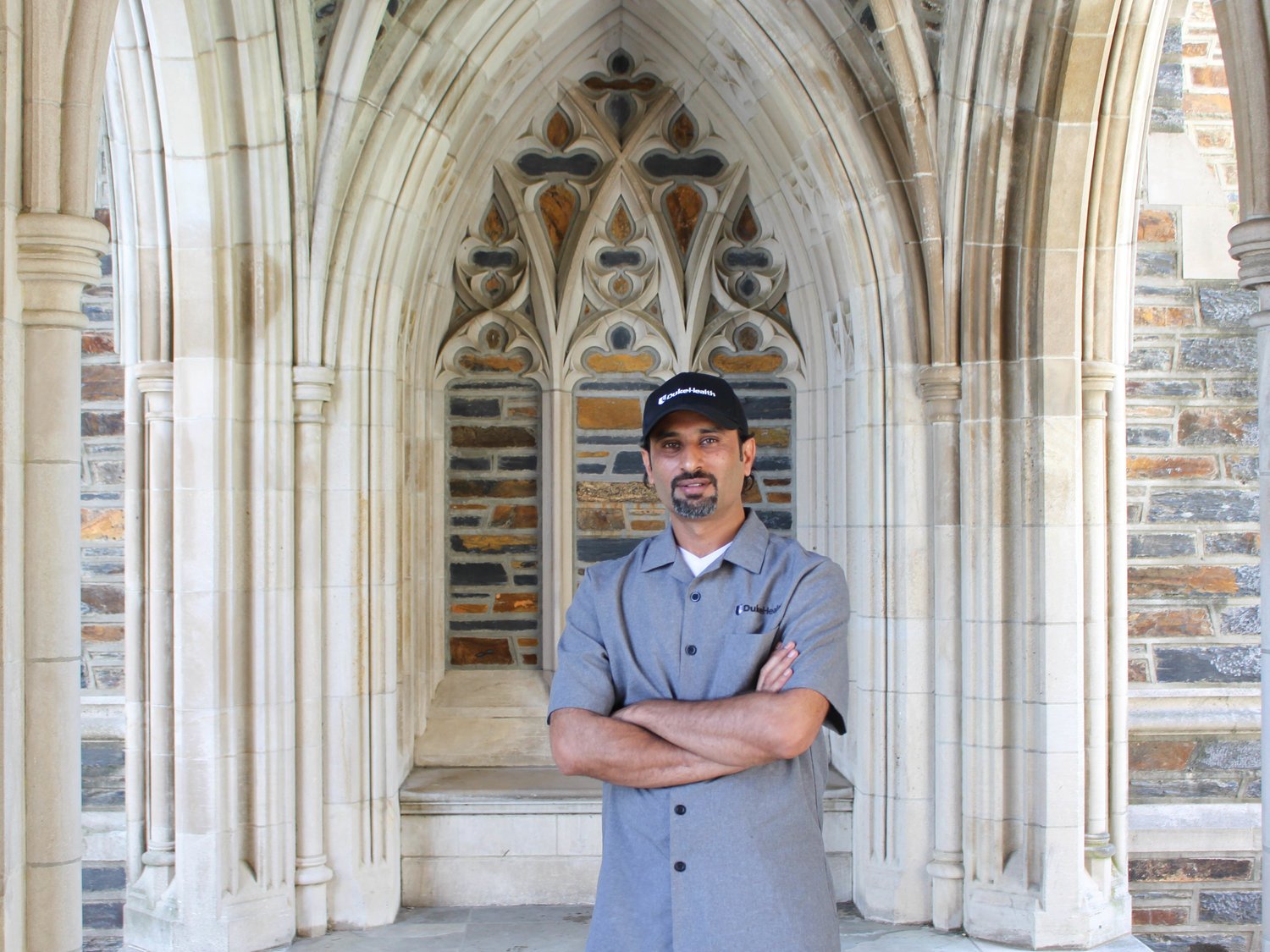April Spotlight: Anees Ahmad
Story and photos by Chris Lee
For some of us, the month of April signifies a seasonal gateway to fresh beginnings. It’s a time when overcast skies and heavy rains give way to glimpses of new light, peeking through cracks in the clouds. Few people demonstrate these qualities of resilience and growth through adversity better than Anees Ahmad, one of our February StepUp graduates.
Originally from Pakistan, Anees moved to the United States in the spring of 2016. Within less than a year, he has achieved high proficiency in English, completed StepUp’s job skills workshop, and has obtained living wage employment as a housekeeping specialist at the Duke University Health System earlier this month. These impressive accomplishments, however, remain secondary to his larger vision: to use his life as a vessel by which to encourage and care for others.
Any conversation with Anees about his life soon shifts to focus instead on his calling to support the people around him. When asked about his personal interests, Anees graciously speaks about what he truly cherishes: “I am assured that the only purpose of our life is to live for others,” he explains. “Otherwise, what can you do? We should not work only to make money. We only have a few years in life, and I want to spend it thinking about and helping other people.”
Even now, as he takes steps to advance in his career, Anees thinks deeply about the close relationships he was forced to leave behind in Pakistan: “I think human beings naturally long for their homeland,” he relates with a sigh. “I miss my country – its weather, its people, my family and friends. When I left, my grandfather had liver cancer. I was supporting him financially here, and it was the most difficult time for me. He was like my father. He passed away two months ago, but even then, I could not go back to my country.”
Back in Pakistan, Anees had successfully managed a tractor showroom run by his family’s business for 12 years, in addition to working in an administrative capacity with other organizations. The difficulty that forced his move to the US, however, was not a surprise.
“I belong to a sect of Islam known as the Ahmadiyya,” he explains. “In the constitution of Pakistan, we are considered minorities, and so we are persecuted on the basis of religion. We cannot practice our religion independently, and we cannot even say ‘As-Salaam-Alaikum’ (a phrase of greeting among Muslims). The law of Pakistan states that we are not Muslims, so we are socially ostracized and killed by others for our religion.”
Anees describes how, despite earning a Master’s degree, he and other Ahmadis were legally barred from opportunities available to others. As a result, his community had to grow successful businesses on their own. Still, due to constant threats against their safety, many Ahmadis have resettled as refugees in countries such as the US, Canada, and Germany.
Due to this persecution, Anees cannot return to Pakistan even if it means missing times of celebration such as family marriages, or times of sorrow such as his grandfather’s passing. Yet somehow, in the midst of this, he insists with optimism that there is no country more beautiful than Pakistan. “It is not always what you see in the news media,” he says. “Our people and the nature are wonderful. The government is corrupt, but the people are good.”
Resettled life in the United States has come with joys and hardships alike. While there is peace and stability, new difficulties have emerged in the form of culture and language.
“Everything in America felt different,” he says. “For example, when I started to take classes at StepUp, I learned that making eye contact is good. In my culture, if I have a meeting with an officer then I have to look at my feet. Also, there are many jobs that my wife cannot do because of her hijab, so to adjust to this culture, we had to take guidance from others.”
While such challenges can be daunting, Anees continues to overcome each difficulty with admirable resolve. He tends to apologize for his English being “not good,” but his proficiency, especially after just one year of study, is extraordinary. English is his sixth language, after all—he also speaks Urdu, Punjabi, Hindi, Saraiki, and Sindhi. Through his new work at Duke, he hopes to practice with native English-speaking co-workers and become fluent in the next year or two.
Anees was first connected to StepUp through Church World Service, a refugee resettlement agency in Durham that assisted him and his wife after their initial arrival. His caseworker Erin referred him to our February workshop, allowing us to partner together on his job search.
“StepUp gave me a basic understanding of why I was not getting a job here. It taught me how to sell myself,” he explains. “I was thinking that I would get a job through my own honesty, my own hard work, but StepUp taught me that this is not enough. You also have to actively sell yourself.
“I had heard that it is very difficult to get a job at Duke, but when I did my interview there, it was only half as difficult as the mock interview I practiced at StepUp. I was prepared, and the interview officer said I did a very good job. He said I was very well dressed – I was wearing the suit that StepUp gave me. Before, I gave interviews with more casual clothes, but this comment proved to me that everything StepUp taught me was true.”
This job, according to him, is only the first step toward a larger vision – one for which he is willing to work tirelessly. Moving to a new country meant that he had to start working as a housekeeper despite his extensive managerial experience in Pakistan. “But I am loving it,” he says, “because I am living in peace. No one is saying I can’t do something because of my religion. I feel now that I can live my life.”
Now that he has secured employment, Anees has thought extensively about goals related to family and education: “I am doing this job wholeheartedly and honestly because I hope to move up. This is my first step. My wife and I want to plan for a new family member, so she needs to be free from work for two or three years and I hope to take on all the expenses. I want to study short courses, obtain a job as a receptionist, learn more English, and finally get a job in the administrative field. I’m not going to waste my time – I will center my vision on this path.”
Remaining true to his university studies in Urdu poetry, Anees enjoys pondering the beauty of nature, in all senses of the word: the nature of the earth, as well as the nature of human beings and of God. His words communicate a rare sensitivity indicative of how deeply and intentionally he thinks. He does not wish to live only for a job to earn money – he believes in living for others, and his actions prove it.
“I am not a rich man, but my wife and I save money every month to give to other Pakistani families who need it more – maybe they are getting married or maybe they are sick. We do not carry that money because this satisfaction motivates me and my wife to work harder. I do not want to forget my life’s purpose.”
In the meantime, Anees plans to help some friends with their own job searches and convince them to join future StepUp workshops. In doing so, he wishes to invest in the community here, for this is where he finds meaning.
“I left my homeland, but in my heart, I have accepted that this country is my new homeland, and it will be the homeland of my children. I want to be a good citizen. I want to not be a burden, I don’t want my children to be a burden on anyone, and I wish that we will be able to help others.
“In a way I have lost my life—I have lost my original life. If I get anything now, then I will use it to help people like me. That is my promise with God. What I want most is the happiness from giving to others what God has given me. Otherwise I don’t have needs. That will be my light.”
Participants like Anees are what truly bring light to StepUp’s mission. On a personal level, I am simply honored to call him my friend.


